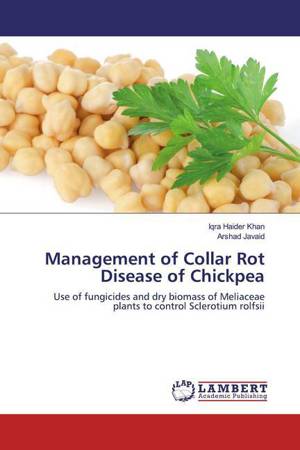
- Afhalen na 1 uur in een winkel met voorraad
- Gratis thuislevering in België vanaf € 30
- Ruim aanbod met 7 miljoen producten
- Afhalen na 1 uur in een winkel met voorraad
- Gratis thuislevering in België vanaf € 30
- Ruim aanbod met 7 miljoen producten
Zoeken
Management of Collar Rot Disease of Chickpea
Use of fungicides and dry biomass of Meliaceae plants to control Sclerotium rolfsii
Iqra Haider Khan, Arshad Javaid
Paperback | Engels
€ 55,95
+ 111 punten
Omschrijving
Chickpea (Cicer arietinum L.), an important pulse, is a good source of carbohydrates and proteins. Sclerotium rolfsii is a soil-born pathogen that causes collar rot disease in chickpea resulting in significant yield losses. In the present study, chemical fungicides, and dry biomass of Melia azedarach and Azadirachta indica were used to control collar rot disease of chickpea. Tebuconazole, mencozeb and thiophanate methyl fungicides were proved very effective against the fungal pathogen. In in vitro antifungal bioassays, different concentrations (0, 0.5, 1.0, ..., 3.5%) of methanolic leaf and fruit extracts of M. azedarach and leaf extract of A. indica reduced fungal biomass by 92-94%, 81-84% and 86-90%, respectively. In vivo experiments were conducted in plastic pots each containing 1 kg sandy loam soil. Pot soil was amended with dry leaf biomass of M. azedarach and A. indica at 1, 2 and 3% w/w. Soil amendments significantly reduced plant mortality due to S. rolfsii and enhanced crop growth. This book is very useful for those who are interested in organic farming.
Specificaties
Betrokkenen
- Auteur(s):
- Uitgeverij:
Inhoud
- Aantal bladzijden:
- 96
- Taal:
- Engels
Eigenschappen
- Productcode (EAN):
- 9783659297939
- Verschijningsdatum:
- 11/03/2015
- Uitvoering:
- Paperback
- Afmetingen:
- 150 mm x 220 mm
- Gewicht:
- 150 g

Alleen bij Standaard Boekhandel
+ 111 punten op je klantenkaart van Standaard Boekhandel
Beoordelingen
We publiceren alleen reviews die voldoen aan de voorwaarden voor reviews. Bekijk onze voorwaarden voor reviews.







